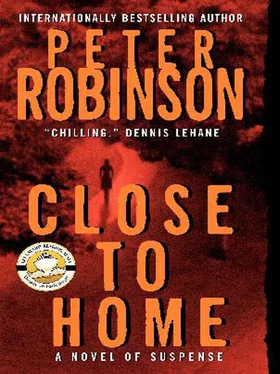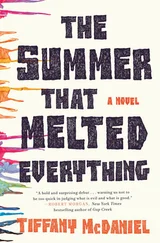“No,” said Martin. “Not at the moment.”
“You don’t have a business number?”
“No.” He paused, then went on as if he’d sensed an implied slight in Annie’s tone or manner. “Look, I might have been just a football player, but that doesn’t mean I’m thick, you know.”
“I didn’t-”
“I got my A-Levels, went to Leeds Polytechnic, as it was back then, and got a business diploma.”
So what did that make him? Annie wondered, unimpressed: the “thinking woman’s crumpet”? “I didn’t mean to imply anything,” she went on. “I’m simply trying to make sure we’ve got every eventuality covered.”
“I’m sorry,” Martin said. “It’s been a stressful night. It’s just, well, being who we are, Robin and I get that sort of thing a lot. People tend to patronize us.”
“I understand,” said Annie, standing up to leave. “I won’t keep you any longer.” She passed her card over to Robin, who was closest. “My mobile number’s on there, too.” She smiled and added, “When you can reach it.” Cell-phone coverage was spotty in the Dales, to say the least. “If you do hear anything at all, you won’t hesitate to call me, will you?”
“No,” said Robin. “Of course not. And if…”
“You’ll be the first to hear. Don’t worry, we’ll be looking for him, I can assure you. We’re really very good at this sort of thing.”
“If there’s anything I can do…” said Martin.
“Of course.” Annie gave them her best, most confident smile and left, not feeling confident at all.
DI Michelle Hart locked up her dark gray Peugeot outside 58 Hazel Crescent and took the measure of the neighborhood. She’d been there twice before – once investigating a string of burglaries and another time because of vandalism. As council estates went these days, the Hazels, as the locals called it, wasn’t particularly bad. Built in the early sixties, before the “new town” expansion, its terraces of serviceable brick houses behind low walls and privet hedges were now home to a mixed crowd of unemployed people, teenage mothers, pensioners who couldn’t afford to move, and a growing Asian population, mostly from Pakistan or Bangladesh. There were even a few asylum seekers. Like every other estate, the Hazels also had its share of shiftless hooligans who took their greatest pleasure in vandalizing other people’s property, stealing cars and spraying graffiti over the walls.
It was still raining, and there was no sign of any gaps in the gray cloud cover. The drab street that curved through the heart of the estate was empty, all the kids indoors playing computer games or surfing the Web and their mothers wishing the sun would come out and bring a few moments’ peace and quiet.
Michelle knocked on the dark green door. Mrs. Marshall, a frail-looking woman, stooped and gray-haired, face lined with care, answered and led her into a small living room and bade her sit on a plum velour armchair. Michelle had met the Marshalls before, during the identification process, but hadn’t yet visited them at home. Everything in the room was so tidy and spotless that she felt a momentary twinge of guilt over her own unwashed breakfast dishes, unmade bed and the dust balls in the corner. Still, who was there to see them but her?
Bill Marshall, incapacitated by a stroke, looked at Michelle, blanket over his knees, walking stick by his side, slack-jawed, a little drool collecting at the corner of his mouth, one half of his face drooping lower than the other, as if it had melted like a Dali clock. He had been a big man, that much was obvious, but now his body had withered with disease. His eyes were alive, though, the whites a little cloudy, but the gray irises intense and watchful. Michelle said hello to him and thought she saw his head move just a fraction in greeting. Though he couldn’t speak, Mrs. Marshall had assured Michelle that he could understand everything they said.
Among the framed photographs on the mantelpiece above the electric fire, one was of a young boy, aged about thirteen or fourteen, hair in a “Beatle” cut popular in the early sixties, wearing a black polo neck, standing on a promenade with the sea in the background and a long pier off to one side. He was a good-looking kid, Michelle noticed, perhaps a little feminine, soft and delicate in his features, but he’d probably have grown up to be a real heartbreaker nonetheless.
Mrs. Marshall noticed her looking. “Yes, that’s our Graham. It was taken on the last holiday he had. We couldn’t go away that year – Bill had a big job to finish – so the Bankses took him to Blackpool with them. Their lad Alan was a good mate of his. Mr. Banks took that photo and gave it to us when they came back.” She paused. “No more than a week or so later, and Graham was gone forever.”
“He looks like a fine boy,” Michelle said.
Mrs. Marshall nodded and sniffed.
“I don’t want to bother you for long,” Michelle began, “but as you can imagine, finding your son after all this time has come as a bit of a shock to us, too. I need to ask a few more questions, if that’s all right?”
“You’ve got your job to do, love. Don’t worry about us. We did our mourning years ago. Most of it, anyhow.” She fingered the collar of her dress. “Funny, though, how it all just seems like it happened only yesterday, now you’ve found him.”
“I haven’t seen the reports yet, but I understand there was a full investigation in 1965, when Graham first disappeared?”
“Oh, yes. And I can’t fault them. They did their best. Searched high and low. Jet Harris himself was in charge, you know. At his wits’ end he was when all their efforts turned up nothing. He even came to search our house for clues himself.”
Detective Superintendent John Harris – nicknamed Jet after both his speed and his resemblance to The Shadows’ bass guitarist – was still a legend around divisional headquarters. Even Michelle had read the small biographical pamphlet published by one of the local bobbies with a literary bent, and she had been impressed by it, from his lowly birth in the Glasgow slums in 1920 to his Distinguished Conduct Medal with the Royal Naval Commandos in the Second World War, his rise through the ranks to detective chief superintendent, and his legendary retirement party in 1985. His framed photograph hung on the wall near the front entrance, and his hallowed name was mentioned only with suitably hushed awe. Michelle could imagine how his failure to solve the Graham Marshall case must have galled him. Harris had a reputation not only for closing cases quickly, but for hanging on and not letting go until he got a conviction. Since his death from cancer eight years ago, he had become even more revered. “It’ll have been done properly, then,” she said. “I don’t know what to say. Sometimes one just slips through the cracks.”
“Don’t apologize, love. I’ve got no complaints. They turned over every stone they could find, but who’d think to dig there, eight miles away? I mean, they could hardly dig up the whole county, could they?”
“I suppose not,” Michelle agreed.
“And there were those missing kids out Manchester way,” Mrs. Marshall went on. “What they later called the Moors Murders. It wasn’t until a couple of months after our Graham disappeared, though, that Brady and Hindley got caught, and then it was all over the news, of course.”
Michelle knew about Ian Brady and Myra Hindley, the Moors Murderers, even though she had been only a child at the time. As with Jack the Ripper, Reginald Christie and the Yorkshire Ripper, the horror of their acts was etched into the consciousness of future generations. She hadn’t realized, though, just how closely their crimes were linked chronologically with Graham Marshall’s disappearance. It might have been natural for Detective Superintendent Harris at least to assume that Graham’s disappearance could somehow be linked with the victims of Brady and Hindley. On the other hand, Peterborough was over a hundred and thirty miles from Manchester, and Brady and Hindley tended to stick to their own neck of the woods.
Читать дальше












